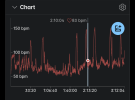D
Deleted member 585490
Guest
Not long been diagnosed with T2 and not been able to do much exercise due to back problems. Reading was 6.8 first thing and took the dog for a 35 minute walk for the first time since being diagnosed. My reading after was 4.1.
Question, does exercise have a significant impact like this as normal? My thinking is that when I'm back in the gym is that to have a protein shake just before hand to keep the balance and small meal after.
Do others have to make adjustments/prepare when doing an hour or so in the gym?
Question, does exercise have a significant impact like this as normal? My thinking is that when I'm back in the gym is that to have a protein shake just before hand to keep the balance and small meal after.
Do others have to make adjustments/prepare when doing an hour or so in the gym?



